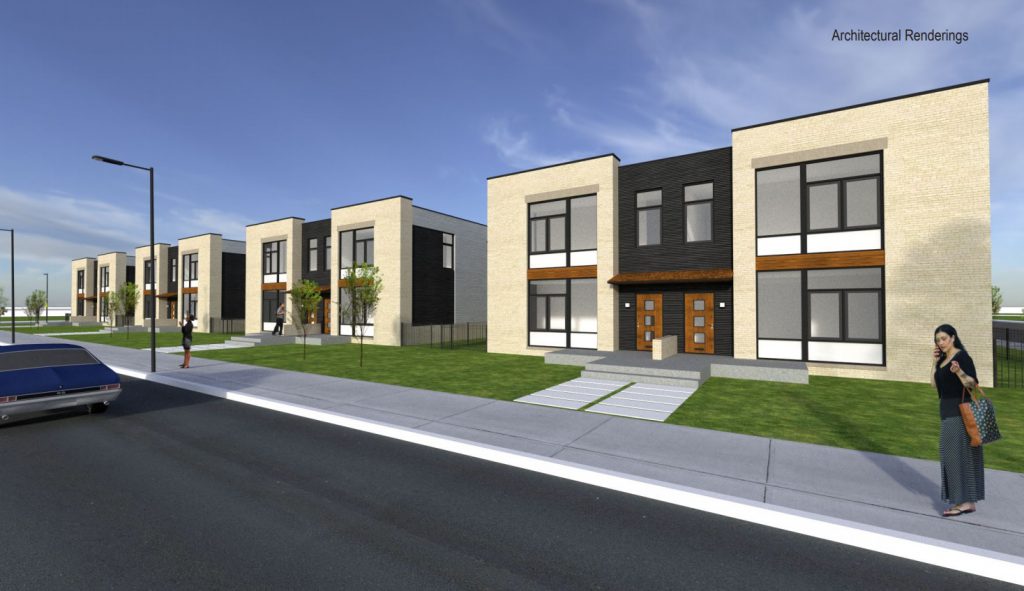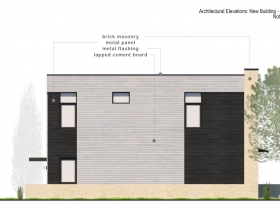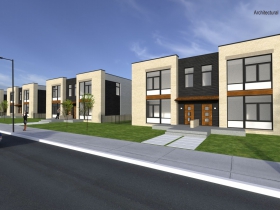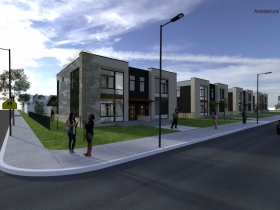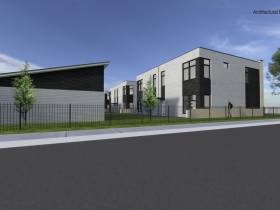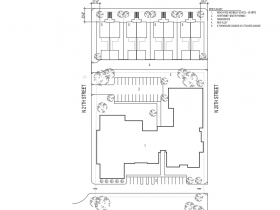Committee Advances McKinley School Project
Opponents demand half the building and half of the low-income housing tax credits.
A proposal to redevelop the former McKinley School at 2001 W. Vliet St. into apartments continues to inch forward despite vocal opposition from a handful of neighbors.
Gorman & Co. is seeking to purchase the vacant school from the city and redevelop it into 35 affordable apartments for veterans. The developer would also add eight market-rate townhomes to the two-acre site’s northern boundary along W. Vliet St.
The Common Council’s Zoning, Neighborhoods & Development Committee granted approval for a zoning change to accommodate the proposal and the exclusive right to negotiate to purchase the city-owned property. The rezoning was recommended for approval last week by the City Plan Commission. The proposal will next go before the full Common Council.
Gorman has already secured approval to leverage historic preservation tax credits to restore the school building, originally built in 1885. With the exclusive right to negotiate the firm will apply for low-income housing tax credits from the Wisconsin Housing and Economic Development Authority. Requests for 2019 are due by December 14th.
Those inspecting the building are currently required to wear head-to-toe protective gear, although both area alderman Robert Bauman and project opponents acknowledge that the building has evidence of regular trespassing.
“This building is almost the quintessential definition of blight,” said Bauman at the project’s hearing last week. Detailing three neighborhood meetings held over a period of 18 months, Bauman said the project has been delayed for months to allow for other parties to come forward with plans for the building. “We had, by that meeting, not received a plan with the exception of some single sheets of paper with some ideas on them,” said Bauman in reference to last week’s meeting.
He thanked Gorman and architecture firm Korb + Associates Architects for listening to feedback from the community. “This project has evolved over a year and a half to where it’s a nice project,” said Bauman. The alderman had pushed for less density on the site and market-rate housing. “I do think it is the best alternative, and frankly the only alternative,” he said about Gorman’s plan.
Joining Bauman in support of the project is Russell W. Stamper, II, who represents the other side of W. Vliet St. “My position is that this building has been sitting there for years. It’s an eyesore and it’s costing taxpayers a significant amount of money,” he said.
Unlike many of the other recently developed schools, which became available in the past decade as MPS enrollment declined in the wake of the growing voucher school system, McKinley was closed by MPS way back in the 1970’s. The district sold the building to the VE Carter Child Development Corporation in 1991. Carter operated a school in the building until 2009 and a day care until 2013. The city gained control of the building in 2016 via property tax foreclosure, the second time since 2010 that the building was foreclosed on by the city.
Vocal Opposition
The project’s most vocal opponent, Gail Winston, testified against the project. She is the estranged wife of WHEDA executive director Wyman Winston.
She said drug dealing and violence is rampant in the neighborhood. In a wide ranging speech, Winston added: “I have Hmong people with three shotguns telling me they shoot squirrels.”
Then she made her biggest demand: “We’re asking an olive branch to give us half the building.” Winston said it would be used for the community’s enrichment.
Nearby resident Carol Caffrey also spoke in opposition to the project. She said she’s working to form a community association to operate a facility within the building.
Caffrey not only asked for half of the building, but half of the affordable housing tax credits. The credits, often sold to larger institutions, are awarded to developers to offset the cost of building new housing that is then rented at below-market rates to those earning less than 60 percent of the area’s median income.
The council did not debate the feedback from the two project opponents, but Bauman did add a clarification. “This is still a contingent transaction. Just so that’s clear. This isn’t a done deal,” said Bauman. Should Gorman secure the low-income housing tax credits, the developer would need to come back to formally purchase the property.
For more on the project, see our coverage from last week.
What Happens If Gorman Fails?
Should Gorman not be able to redevelop the building, the city has a bigger problem on its hand. “We cannot afford the million plus to bring this property down,” said Turim. And according to Mayor Tom Barrett‘s 2019 budget proposal, she’s right. The mayor’s proposal allocated only $1 million for all city demolitions or deconstructions in 2019, with the city planning to demolish or deconstruct 28 properties out of the 475 that are eligible. Bauman successfully introduced an amendment to add $1.5 million to the fund via bonding, but Barrett has yet to release any budget vetoes.
Renderings
If you think stories like this are important, become a member of Urban Milwaukee and help support real independent journalism. Plus you get some cool added benefits, all detailed here.
Political Contributions Tracker
Displaying political contributions between people mentioned in this story. Learn more.
- November 1, 2018 - Tom Barrett received $1,200 from Ted Matkom
- April 11, 2018 - Tom Barrett received $400 from Ted Matkom
- March 10, 2016 - Tom Barrett received $35 from Amy Turim
- February 22, 2016 - Tom Barrett received $1,000 from Ted Matkom
Eyes on Milwaukee
-
Church, Cupid Partner On Affordable Housing
 Dec 4th, 2023 by Jeramey Jannene
Dec 4th, 2023 by Jeramey Jannene
-
Downtown Building Sells For Nearly Twice Its Assessed Value
 Nov 12th, 2023 by Jeramey Jannene
Nov 12th, 2023 by Jeramey Jannene
-
Immigration Office Moving To 310W Building
 Oct 25th, 2023 by Jeramey Jannene
Oct 25th, 2023 by Jeramey Jannene


